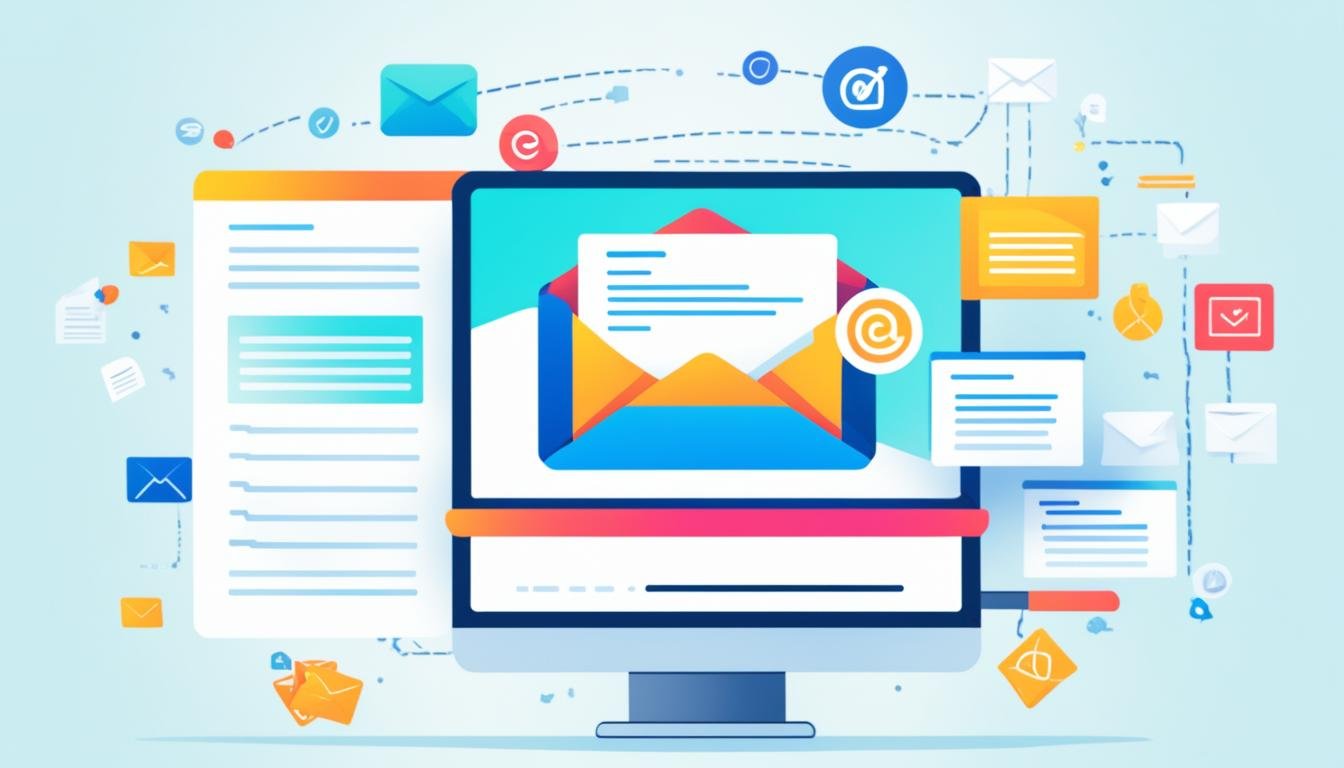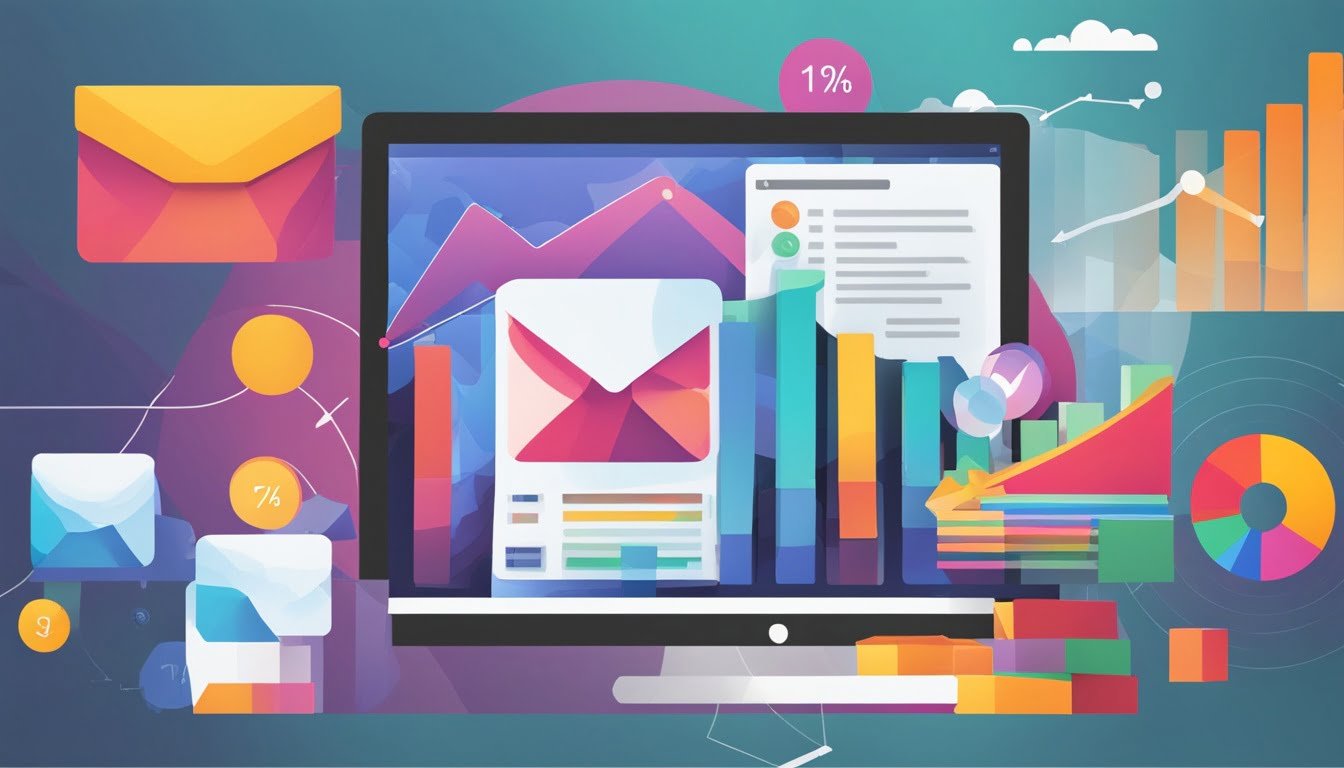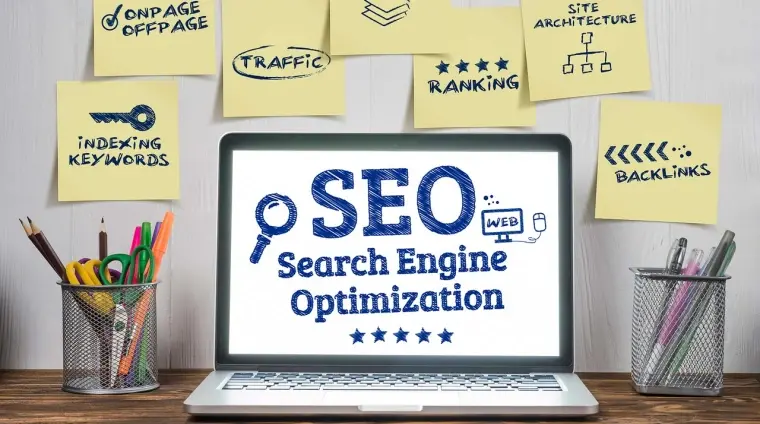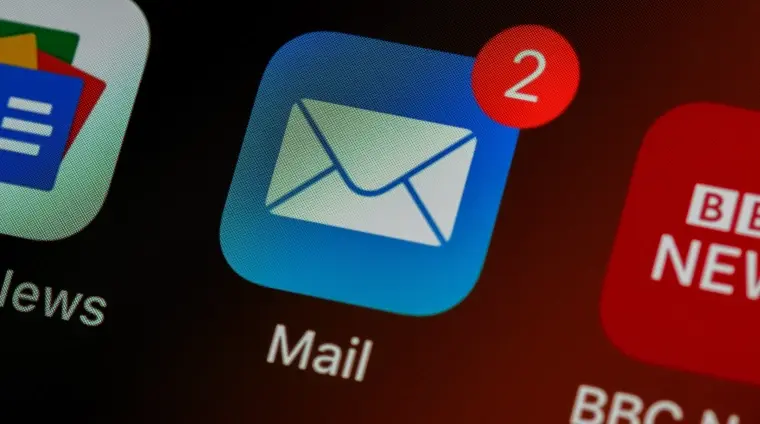More than 361 billion emails are sent every day. This number could hit 376 billion by 2025. Email marketing remains a powerful tool for generating leads and making sales. According to HubSpot, 94% of marketers see its value for hitting business targets. To succeed, you must use proven strategies.
Key Takeaways
- Email marketing has the best return on investment (ROI), with an average of $42 return for every $1 spent.
- Personalized subject lines can increase email open rates by 26%.
- Segmented email campaigns lead to a 760% increase in company revenue.
- Personalized emails deliver 6x higher transaction rates.
- 46% of all marketing emails were opened on a mobile device in 2022.
The Power of Email Marketing
Every day, more than 361 billion emails are sent. By 2025, this will hit 376 billion. Email marketing plays a crucial role in digital marketing strategies. For the top marketers, email is their favorite. They see a great return, making $42 for every $1 spent. Creating catchy email subjects can boost opens by 26%. Marketers using specific target groups saw a 760% increase in sales.
Email Marketing ROI Statistics
Over the last decade, email marketing has topped other marketing channels in ROI. For each dollar spent, the average return was $36. In some cases, businesses made up to $44 for every dollar they invested. Moreover, email marketing benefits show a 66% purchase rate from promotional emails. It’s also 40 times more effective than social media in gaining new customers.
Benefits of Email Marketing
Email marketing, besides its great ROI, also has numerous benefits. About 90% of emails reach the recipient’s inbox, but only 2% of Facebook posts are seen. The email campaign click-through rate is 3%, higher than Twitter’s 0.5%. Plus, 24% of those from email ads make a purchase, in comparison to just 2.49% from search engines and 0.59% from social media.
| Metric | Email Marketing | Other Channels |
|---|---|---|
| Inbox Delivery Rate | 90% | 2% (Facebook) |
| Click-Through Rate | 3% | 0.5% (Twitter) |
| Conversion Rate | 24% | 2.49% (Search), 0.59% (Social) |
| Return on Investment | $36 per $1 spent | $44 per $1 spent |
This data underscores the power and importance of email marketing. It is a key part of an effective digital marketing strategies.
Personalize Your Messages
Personalization means using customer data to create a message just for them. Amazon, for instance, personalizes emails. It uses the recipient’s name and suggests items based on what they’ve bought before. This approach has shown to boost sales by 6 times. Also, 82% more people open emails that are made just for them.
Use Customer Data for Personalization
Starting an email with the reader’s name can make them 10-14% more likely to open it. Other ways to make emails personal include using a real reply-to email, a genuine email signature. Don’t forget to tailor messages based on the reader’s industry, company size, and sales position.
Personalize Email Greetings
Making email greetings personal really works. Experian discovered that adding a person’s name to the subject line can increase the chances of someone opening the email by 26%. This shows the power of saying “hello” the right way.
Include Real Email Signatures
A real email signature can do wonders. It shows you’re a real person and not a robot. This little detail can make email contact more meaningful and credible for customers.
Segment Your Email List
Segmenting your email list has become a top priority for email marketers. When you organize your list, you can send emails that are just right for each group. And that means your campaigns can make a real impact. In fact, companies see a big 760% jump in revenue from segmented campaigns.
Segment by Industry
Diving emails by industry is a smart move. You might target auto parts companies with certain deals. Or, send conference invites tailored for tech companies.
Segment by Company Size
You can also group emails by company size. This helps you speak directly to what small, medium, or big businesses might need. It’s a way to make your offers hit the mark for everyone.
Segment by Sales Cycle Stage
Even the sales process stage can guide your email grouping. If someone is just looking around, they might like learning content. While someone nearly ready to buy may prefer your direct sales pitch. This way, every stage of the buying journey feels right for the potential customer.
| Segmentation Approach | Benefit |
|---|---|
| Segmentation by Industry | Allows you to tailor content and offers to the specific needs of different business sectors. |
| Segmentation by Company Size | Enables you to craft messaging that resonates with small, medium, or enterprise-level organizations. |
| Segmentation by Sales Cycle Stage | Helps you nurture leads more effectively by delivering the right content at the right time in the buyer’s journey. |
Using these email list segmentation tips makes for focused and effective campaigns. It’s about knowing your audience, be it through their industry, company size, or where they are in the sales cycle. Then, you can tailor your messages and offers exactly to what they need.
Mobile Optimization for Email Marketing
In today’s world, being mobile-ready is key for email marketing. About 46% of emails get opened on a phone. Plus, 58% of people start their day by checking emails on their phones. This shows why mobile-friendly email marketing is so important now.
Implement Responsive Email Design
Making your emails look good on any screen is a must. That’s where responsive email design comes in. It ensures everything, from text to images, fits well and is easy to use on mobile.
For better results, consider these design tips. Give clickable things more space and put the main actions up top. This can make people more likely to interact with your email.
Because almost three-quarters of folks will trash an email that looks bad on their phone, going mobile-first is critical. When you tailor your emails for small screens, you draw more attention. This leads to better engagement with your readers, even when they’re not at their desks.
Avoid Spam Filters and Blacklisting
In today’s world, about 45% of emails are seen as spam. This leads email providers to watch senders closely. They aim to block those who appear spammy. So, it’s key to send relevant and valuable content to reach inboxes, not spam folders.
Send Relevant and Valuable Content
The best way to avoid spam filters is by offering truly helpful content. Steer clear from false subject lines, spam words, or irrelevant deals. These things trigger modern spam filters, run by smart computers.
Use Custom Email Domains
When it comes to avoiding email blacklisting, using a custom domain counts. Free emails like Gmail or Yahoo might not scream trustworthiness. However, a custom domain shows you’re more serious and can help your emails land safely.
Maintain Clean Email Lists
Regularly cleaning your email list is vital for both avoiding spam and keeping readers interested. Remove those who don’t interact from your list. A clean list not only boosts your numbers but shows you care about what your audience receives.
Email Marketing Automation
In today’s digital world, email marketing automation is transforming how businesses market themselves. It allows them to streamline their marketing work and become more efficient. With automation, tasks like sending scheduled emails, grouping customers by interest, and using ready-made designs for emails can all be done automatically. This translates to saving time and making email campaigns work better.
What makes email marketing automation stand out is how it makes messages personal and sent at the perfect time. You can set up automated emails to go out when someone leaves items in their online cart but doesn’t buy, or when they haven’t interacted with your website in a while. These personalized messages improve how your subscribers feel about your brand and help turn more of them into customers.
Running automated email campaigns also helps keep your brand in front of people, nurture new leads, and reconnect with those who’ve gone quiet. By letting technology handle the routine parts, your marketing team can focus on creating better strategies. This way, you can offer a smoother experience to your audience.
To really gain from email marketing automation, it’s vital to link it with your marketing plan. Make sure to check on how things are going and tweak your automated processes to make them even better. With the right approach, automation can make your marketing stronger and find ways for your business to grow.

Create Compelling Subject Lines
The subject line of an email is the first thing someone sees. This is crucial because it often decides if the email will be opened or not, with a 64% chance of getting deleted. To make your subject lines stand out, try different things. Use power words that make people feel something or act fast. This can really help get more people to open your emails. Also, keep the subject lines short. Aim for around 30 characters if they’ll be seen on a phone, and around 60 for computers. This way, the whole message will show, no matter how someone reads their email.
Use Power Words in Subject Lines
Choosing the right words for your subject line can grab people’s attention. Words like “reasons”, “introducing”, and “discover” can make your email sound interesting. But be careful not to overdo it with words like “act now,” which might seem like spam. It’s all about making people curious in an honest way. This will increase the chances of them opening your email.
Keep Subject Lines Concise
Since about 46% of emails are opened on phones, it’s best to be brief with your subject lines. Phones only show a few words before they cut off. Limit your subject line to about 9 words or 60 characters. This way, the whole line shows up on phones and other devices. Web emails, like Gmail, also have a character limit. It’s best to stay under 55 characters to avoid getting cut off.
Personalize Subject Lines
Adding a bit of personalization can really help your emails. Mentioning the person’s name or other details makes your message seem more personal. But, remember not to overdo it. If you use personalized details too much, they might lose their effect. Finding the right amount of personal touch will help your emails stand out.
Grow Your Email List Organically
Don’t buy contact lists. They often have wrong emails and can lead to being marked as spam. Instead, focus on adding people to your email list organically. Offer interesting content to get folks to sign up for your newsletter. This way, you’re sure to reach people who are truly interested. You’re creating a email list building strategies that’s strong and healthy.
Working with other businesses on shared content can also be a smart move. It opens the door to a new group of people. And it’s usually a cheaper way to expand your list. As for your website, keep the sign-up simple and visible. Adding catchy banner ads to your email signature can attract more readers, too.
Keeping your email list in good shape is vital. Lists start to lose about 22.5% of subscribers every year. To fight this, remove those who don’t open your emails anymore. And try to bring back those who seem to have lost interest. This keeps your email list effective and fruitful.
| Strategies for Growing Your Email List Organically | Potential Impact |
|---|---|
| Create engaging top-of-funnel content | Attracts new, interested subscribers |
| Leverage co-branding partnerships | Taps into a new audience at a low cost |
| Use simple, focused sign-up forms | Increases conversion rates on your website |
| Implement eye-catching email signature banners | Drives traffic to your sign-up forms |
| Regularly clean and re-engage your email list | Maintains the quality and effectiveness of your list |
By using these email list building strategies, your email list will grow naturally. You’ll connect with people who want to hear from you. This results in a community that’s eager to respond.
Leverage Email Analytics
It’s important to keep a close eye on how your emails are doing. This means looking at things like how many people open them or click through. Knowing what works lets you make your emails even better. Always looking at the data can lead to big improvements.
Email income metrics are key to seeing if you’re reaching your business goals. Adding up the money from emails and text messages offers a full look at how well you’re doing. Comparing this to your total income helps measure the power of your emails and texts.
Figuring out your Email Return on Investment is simple with a formula. This ROI shows how much you gained from your emails after all costs. It’s important to think about everything you spent, like on designs or finding leads, to manage your budget well.
| Metric | Description | Formula |
|---|---|---|
| Open Rate | Percentage of recipients who opened an email | Opened emails / Delivered emails |
| Click-through Rate (CTR) | Percentage of recipients who clicked on a link in the email | Clicked links / Delivered emails |
| Conversion Rate | Percentage of recipients who completed a desired action | Conversions / Delivered emails |
| Bounce Rate | Percentage of emails that could not be successfully delivered | Bounced emails / Attempted deliveries |
| List Growth Rate | Rate at which the email list grows | (New subscribers – Unsubscribes) / Total subscribers |
| Email Sharing/Forwarding Rate | Percentage of recipients who shared or forwarded the email | Shared/Forwarded emails / Delivered emails |
| Unsubscribe Rate | Percentage of recipients who opted out of receiving emails | Unsubscribes / Delivered emails |
Creating reports just right for your business is essential. This kind of report helps you keep track of how your emails are doing financially and where you can save money. It’s all about making smart choices based on the data.
Getting your emails to the right inboxes is key to success. If your key numbers in email sales are too low, it signals you need to fix some things. By working on these issues, you can make your campaigns better.
Making the most of the seasons in your emails is smart. This means sending emails at the best times, like before big sale seasons. A special index can show you how your sales change with the seasons. It’s all about finding the best times to send your emails.

Email Marketing Best Practices
In addition to the strategies covered, following email marketing best practices is crucial for success. Make sure your emails have clear and compelling calls-to-action. Always follow up with subscribers who interact with your emails. Also, test different parts of your emails to make them work even better over time.
Include Clear Calls-to-Action
When sending emails, always have a clear CTA. This pushes people to take action, like buying something or signing up. Make your CTA visually noticeable. Use strong action words to motivate your audience.
Follow Up with Subscribers
Keep your email efforts alive beyond the first send. Talk to subscribers who’ve clicked links or bought something. This keeps them interested and can boost sales.
A/B Test Email Campaigns
Tinkering and testing is crucial for email success. Try different subject lines, CTAs, and content to see what works best. By testing, you can pick what your audience likes most and get better results.
Email Marketing
Email marketing is both cheap and effective, making it a vital part of any digital marketing strategy. This article will show you how to make email campaigns that really work for your business.
With email, you can talk to a lot of people at once, make messages personal, and keep track of how well you’re doing. This is a big chance to connect with the right customers and grow your business for real. No matter your goal – from getting new leads to selling more to people who already buy from you, a smart email marketing plan can boost your digital marketing results in a big way.
Follow our advice on things like sorting lists, making emails work well on phones, and using data to speak directly to your crowd. These tactics help your email marketing stand out and hit home with people. Keep testing, learning, and improving your game to make the most of your digital marketing efforts.
Conclusion
Email marketing is a powerful tool for marketers. When you personalize messages and segment your list, you make a big impact. It’s also key to make your emails mobile-friendly and follow the best practices.
These steps will lead to strong campaigns and business growth. The average ROI is 42:1, and 72% of people like getting deals by email. This shows how important a good email strategy is.
To be successful, keep up with email trends and always test what works. More than 4.48 billion people are expected to use email by 2024. So, the influence of email marketing will keep growing.
It’s not just about sending sales messages. It’s about creating a bond and sharing value with your audience. Focus on the customer to make the most of this marketing tool.
FAQ
What are the key email marketing strategies that can deliver results?
The key to successful email marketing is making messages personal. It’s important to segment your email lists. Always optimize for mobile to reach more people.
To stay out of spam filters, avoid spammy words and buy lists. Instead of one-off emails, use automated campaigns. Catch your readers’ eyes with strong subject lines.
To grow your list, encourage sign-ups on your website. Always follow good email practices, like encouraging feedback and testing your emails often. This will keep your marketing fresh and effective.
What are the benefits of email marketing and its ROI?
Email marketing is a powerful tool. It offers great returns, averaging for every dollar spent. For most marketers, it’s a key way to meet their business goals.
How can I personalize my email messages?
By using customer data, you can tailor your emails. Address your recipient by name. Use a real email address to reply from and a genuine sign-off. These touches can boost your success rates significantly.
What are effective ways to segment my email list?
Separate your list based on industry, company size, and where they are in the sales process. Targeted emails help increase revenue by a striking 760%.
How can I optimize my emails for mobile devices?
Make your emails mobile-friendly using responsive designs. Leave enough space between links and calls-to-action. Since many people read emails on mobiles, this is crucial.
How can I avoid spam filters and email blacklisting?
Send only useful information. Have a custom email domain. Keep your list clean by removing inactive subscribers. This ensures your emails are welcomed in people’s inboxes.
What are the benefits of email marketing automation?
Automation saves time and makes your marketing more effective. It allows for personalized and timely emails without manual effort. This increases efficiency and engagement with your audience.
How can I create compelling email subject lines?
Use powerful words to grab attention. Keep the subject line short, under 30 characters for mobile. Personalize subject lines or use data. Always track which lines work best.
What are some strategies for growing my email list organically?
Create content that attracts people to sign up. By focusing on top-of-funnel content, you’ll reach more potential clients. This way, your list will grow with engaged people.
How can I leverage email marketing analytics?
Look at open and click rates to see what’s working. This data helps you refine your strategies for better results. Regularly checking these numbers is key to a successful campaign.
What are some best practices for email marketing campaigns?
Always include clear calls-to-action. Follow up with those who show interest. Test different aspects of your emails, like subject lines and content, to find what works best. This approach leads to more effective campaigns.
Source Links
- https://www.superoffice.com/blog/email-marketing-strategy/
- https://blog.hubspot.com/blog/tabid/6307/bid/23965/9-email-marketing-best-practices-to-generate-more-leads.aspx
- https://www.campaignmonitor.com/resources/guides/why-email/
- https://www.forbes.com/sites/forbesbusinessdevelopmentcouncil/2023/08/21/decoding-the-future-the-power-of-email-marketing/
- https://myemma.com/blog/7-email-personalization-strategies-that-go-beyond-a-name/
- https://sendgrid.com/en-us/blog/6-tips-and-examples-for-personalized-email-marketing
- https://blog.hubspot.com/blog/tabid/6307/bid/34146/7-excellent-examples-of-email-personalization-in-action.aspx
- https://mailchimp.com/resources/email-segmentation/
- https://optinmonster.com/50-smart-ways-to-segment-your-email-list/
- https://www.campaignmonitor.com/blog/email-marketing/mobile-friendly-email-tips/
- https://www.pipedrive.com/en/blog/mobile-email-marketing-best-practices
- https://www.mailmodo.com/guides/mobile-email-design/
- https://contentmarketinginstitute.com/articles/best-practices-avoid-email-spam-filters/
- https://www.campaignmonitor.com/resources/guides/email-automation/
- https://mailchimp.com/marketing-glossary/email-automation/
- https://dotdigital.com/blog/how-to-write-email-subject-lines-that-get-opened/
- https://mailchimp.com/help/best-practices-for-email-subject-lines/
- https://blog.hubspot.com/marketing/improve-your-email-subject-line
- https://myemma.com/blog/8-ways-to-grow-your-email-list-organically-and-fast/
- https://www.wisestamp.com/blog/grow-email-list/
- https://essenceofemail.com/blog/leverage-email-marketing-analytics
- https://blog.hubspot.com/marketing/metrics-email-marketers-should-be-tracking
- https://www.salesforce.com/resources/articles/email-marketing-best-practices/
- https://sendgrid.com/en-us/resource/email-marketing-best-practices-tips
- https://www.campaignmonitor.com/resources/guides/getting-started-with-email-marketing/
- https://mailchimp.com/marketing-glossary/email-marketing/
- https://helpmonks.com/blog/10-reasons-why-email-marketing-is-the-best-channel-for-your-business/
- https://blog.icontact.com/why-is-email-marketing-still-relevan/














